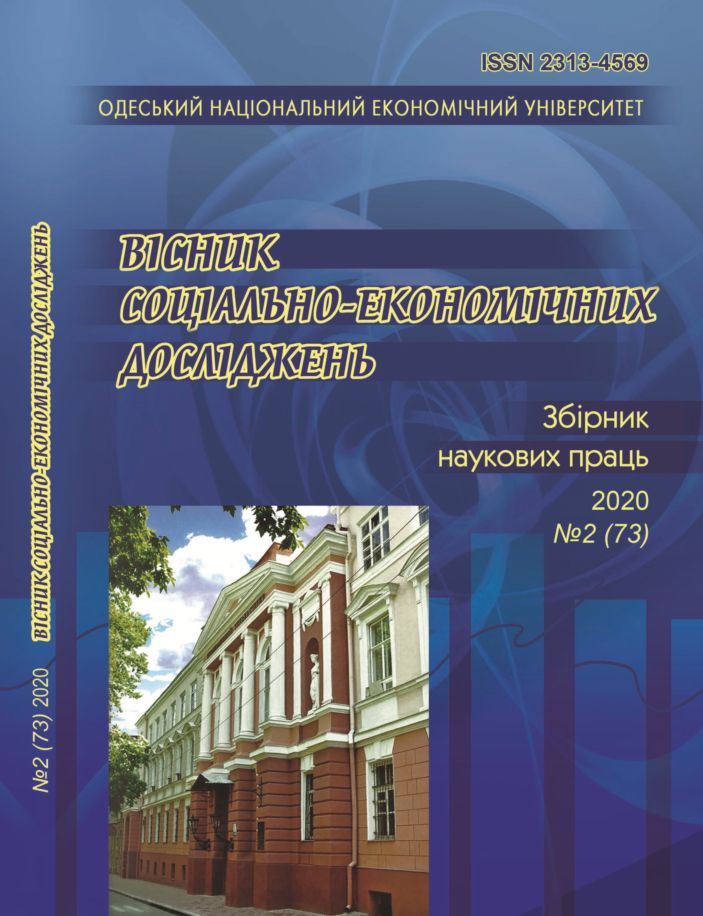Empirical analysis of the impact of population increase on the economic growth of Africa’s most populous country
DOI:
https://doi.org/10.33987/vsed.2(73).2020.27-45Keywords:
population, growth, labour force, economic growth, ARDL, Nigeria, AfricaAbstract
The concern about population growth in many developing countries has become a burning issue in the literature. Furthermore, many divergent views exist on whether increasing population is useful or harmful to growth in the economy. This study therefore, analysed the impact of population increase on economic growth in Nigeria, as an Africa’s most populous country. The study employed time series data from 1985–2018 using the framework of the Autoregressive Distributed Lag (ARDL) Model. The findings of this study revealed that the population growth of the economy supports economic growth both in the short and long term. However, it may become explosive in the long run if vital measures are not taken to control it. Since population increase has a huge impact on economic growth, the government should take steps to ensure that the population continues to increase the country’s growth trajectory by equipping the workforce with the appropriate skills. Therefore, to enhance sustainable development, the study proposes to formulate an effective government policy in order to ensure the growing labour force with jobs and modern qualification skills in accordance with the requirements of the labor market and increasing the country’s GDP. Also, there is need to formulate effective financial policies and support competitive interest rates in order to improve the economy’s savings rate. Effective monitoring of the economy’s capital-output ratio should ensure its increase in GDP, and the prohibition of effective state policy should be enacted to maintain stable and non-escalating population growth rate.
References
Aidi, H., Emecheta, C., & Ngwudiobu, I. (2016). Population Dynamics and Economic Growth in Nigeria. Journal of Economics and Sustainable Development, Vol. 7, No. 15, pp. 16–24.
Ali, S., Alam, K., Islam, S., & Hossain, M. (2015). An Empirical Analysis of Population Growth on Economic Development: A Case Study of Bangladesh. International Journal of Economics, Finance and Management Sciences, Vol. 3, No. 3, pp. 252–259. DOI: 10.11648/j.ijefm.20150303.21.
Ali, S., Ali, A., & Amin, A. (2013). The Impact of Population Growth on Economic Development in Pakistan. Middle-East Journal of Scientific Research, Vol. 18 (4), pp. 483–491. DOI: 10.5829/idosi.mejsr.2013.18.4.12404.
Almendarez, L. (n.d.). Human Capital Theory: Implications for Educational Development. Retrieved December 18, 2017, from Open: http://www.open.uwi.edu/sites/default/files/bnccde/belize/conference/papers2010/almendarez.html.
Anudjo, E. (2015). The Population Growth – Economic Growth Nexus: New Evidence from Ghana. University of Ghana. Retrieved from: http://ugspace.ug.edu.gh/handle/123456789/8484?show=full.
Barone, R. (2017). The Importance of Economic Growth and the Consequences of its Demise. Retrieved December 21, 2017, from Forbes: https://www.forbes.com/sites/greatspeculations/2017/06/09/the-importance-of-economic-growth-and-the-consequences-of-its-demise/#3c6a 588a3966.
Coale, A., & Hoover, E. (1959). Population Growth and Economic Development in Low-Income Countries. The American Economic Review, Vol. 49, No. 3, pp. 436–438.
Esu, G., & Udonwa, U. (2016). Determinants of Economic Growth in Nigeria: Population Perspective. Journal of World Economic Research, Vol. 5, Issue 4, pp. 31–42. DOI: 10.11648/j.jwer.20160504.12.
Headey, D., & Hodge, A. (2009). The Effect of Population Growth on Economic Growth: A MetaRegression Analysis of the Macroeconomic Literature. Population and Development Review, Vol. 35, No. 2, pp. 221–248. DOI: https://doi.org/10.1111/j.1728-4457.2009.00274.x.
Ibenegbu, G. (2017). Population Growth in Nigeria. Retrieved December 20, 2017, from Naij.com: https://www.naija.ng/1127784-effects-population-growth-nigeria.html#1127784.
J., Y. (n.d.). Population Growth: Demographic Transition and Malthusian Theories. Retrieved December 19, 2017, from Study.com: https://study.com/academy/lesson/population-growthdemographic-transition-and-malthusian-theories.html.
Koduru, C. (2016). Effect of Population Growth on Economic Development in India. Retrieved Feburary 2019, from ResearchGate: https://www.researchgate.net/publication/309158950_Effect_of_Population_Growth_on_Economic_Development_in_India?enrichId=rgreq-aef3b a74dec3d83dd1e312187fb7a302-XXX&enrichSource=Y292ZXJQYWdlOzMwOTE1ODk1MDtBUzo0MTczMDQ4ODMwMjM4NzJAMTQ3NjUwNDY0NTY4Mw%3D%3D&e.
Kwat, N. (n.d.). Top 3 Theories of Population. Retrieved December 19, 2017, from Economics Discussion: http://www.economicsdiscussion.net/theory-of-population/top-3-theories-ofpopulation-with-diagram/18461.
Mahendra, K. (n.d.). Population Growth and Economic Development: A Close View. Retrieved December 20, 2017, from Economics Discussion: http://www.economicsdiscussion.net/economic-development/population-growth-and-economic-development-a-close-view/11808.
Nwosu, C., Dike, O., & Okwara, K. (2014). The Effects of Population Growth on Economic Growth in Nigeria. The International Journal of Engineering and Science (IJES), Vol. 3, No. 11, pp. 7–18.
Odusina, E. K. (2010). Implications of a Rapidly Growing Nigerian Population: A Review of Literature. Osun State: Joseph Ayo Babalola University. Retrieved from: https://uaps2011.princeton.edu/papers/110048.
Ogunleye, O., Owolabi, O., & Mubarak, M. (2018). Population Growth and Economic Growth in Nigeria: An Appraisal. International Journal of Management, Accounting and Economics, Vol. 5, No. 5, pp. 282–299.
Oramah, I. (2006). The Effects of Population Growth in Nigeria. Journal of Applied Sciences, Vol. 6, pp. 1332–1337. DOI: 10.3923/jas.2006.1332.1337.
Preston, S., & Donaldson, P. (1986). Population growth and economic development. Asia Pac Popul J., Vol. 1, No. 2, pp. 3–12.
Rosenzwig, R. M. (1987, July). Human Capital, Population Growth and Economic Development: Beyond correlation. The University of Chicago Press Journals, Vol. 98, No. 5, pp. 38–70.
Sinding, S. (2009). Population, poverty and economic development. Philos Trans R Soc Lond B Biol Sci, Vol. 364, Issue 1532, pp. 3023–3030. DOI: https://doi.org/10.1098/rstb.2009.0145.
Tartiyus, E., Dauda, M., & Amade, P. (2015). Impact of Population Growth on Economic Growth in Nigeria (1980–2010). IOSR Journal of Humanities and Social Science (IOSR-JHSS), Vol. 20, Issue 4, pp. 115–123. DOI: 10.9790/0837-2045115123.
Thornton, J. (2001). Population Growth and Economic Growth: Long-Run Evidence from Latin America. Southern Economic Journal, Vol. 68, Issue 2, pp. 464–468.
Thuku, G., Paul, G., & Almadi, O. (2013). The Impact of Population Change on Economic Growth in Kenya. International Journal of Economics and Management Sciences, Vol. 2, No. 6, pp. 43–60. DOI: 10.4172/2162-6359.1000137.
Wesley, E., & Peterson, F. (2017). The Role of Population in Economic Growth. SAGE Open, Vol. 7, Issue 4, pp. 1–15. DOI: https://doi.org/10.1177/2158244017736094.
Downloads
Published
Issue
Section
License
Copyright (c) 2020 Socio-Economic Research Bulletin

This work is licensed under a Creative Commons Attribution 4.0 International License.






